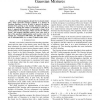Free Online Productivity Tools
i2Speak
i2Symbol
i2OCR
iTex2Img
iWeb2Print
iWeb2Shot
i2Type
iPdf2Split
iPdf2Merge
i2Bopomofo
i2Arabic
i2Style
i2Image
i2PDF
iLatex2Rtf
Sci2ools
CORR
2008
Springer
2008
Springer
Message-Passing Decoding of Lattices Using Gaussian Mixtures
A belief-propagation decoder for low-density lattice codes, which represents messages explicitly as a mixture of Gaussians functions, is given. In order to prevent the mixture elements from growing as the decoder iterations progress, a method for reducing the number of Gaussians at each step is given. A squared distance metric is used, which is shown to be a lower bound on the divergence. When used for the "Poltyrev system", the proposed algorithm achieves error rates close to that of the quantized implementation used in prior work. For example, for a dimension 1000 lattice, the difference in error rate is indistinguishable over a range of signal-to-noise ratios.
Related Content
| Added | 09 Dec 2010 |
| Updated | 09 Dec 2010 |
| Type | Journal |
| Year | 2008 |
| Where | CORR |
| Authors | Brian M. Kurkoski, Justin Dauwels |
Comments (0)

